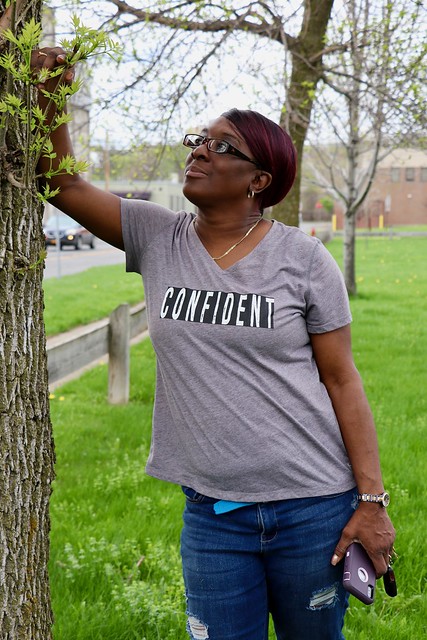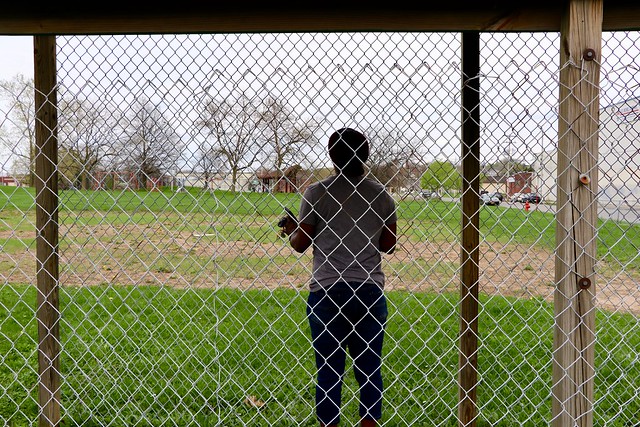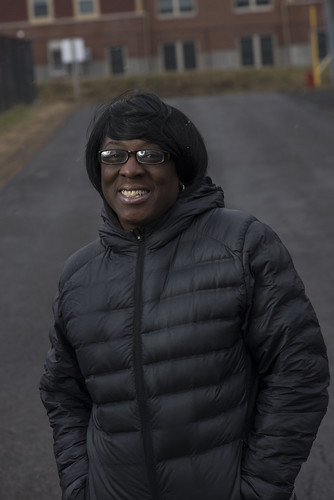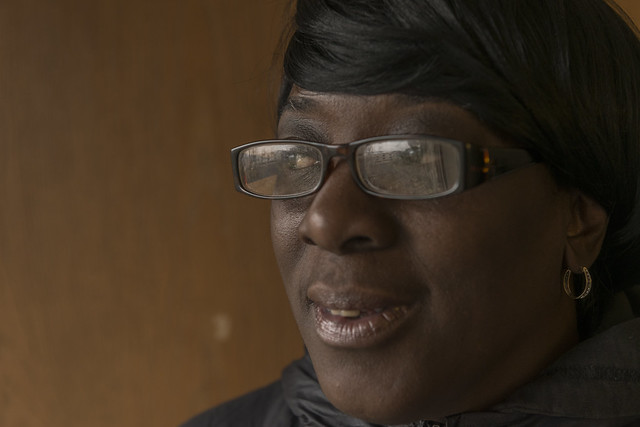Former parolee returned to Syracuse for second chance and to help others
Karen Loftin sits on the edge of the park bench. She tucks a strand of hair back behind her ear, her long, perfectly-manicured nails shining in the afternoon sunlight. A gold chain clinks around her neck. She wears a shirt embossed with one bold word — Confident.

Turning to the camera, she smiles unwaveringly. After the shutter goes off, she stands up.
“Take a photograph of me near the tree!” she says, her face lighting up with childlike energy. She runs towards a trunk covered in vines.
Karen’s warm demeanor is one of her most striking traits. I first met her at PEACE Inc.’s Emma L. Johnston Southside Family Resource Center. PEACE is a non-profit organization which provides services to the community, one of which is re-entry support for former prisoners and parolees.
Before I met Karen, I was aware she had served some jail time on drug abuse and prostitution charges, but that was the extent of what I knew about her.
A few days after our first meeting, Karen told me about her involvement with PEACE. Over banana bread and coffee, she told me that after being off parole for 16 years, PEACE hired her to work under the Family Reunification Pilot grant. Her job was to work with each former prisoner and parolee and give them specialized support to smooth their transition from prison to family life.
On our way to the center that morning, Karen told me she was HIV positive. She said she had discovered her status more than 25 years ago after the birth of her second child. She told me in the most matter-of-fact way, but shared talking about her disease hasn’t always been this easy because of the stigma that surrounds her condition.
A regular volunteer at the center, Karen helps people in the community living with HIV by showing them how they can effectively manage the disease and stay positive throughout it all.
“Society says once you’re something, you’re always going to be that. There’s no room to change,” Karen said. “That was one thing I have always had to fight through.”
A TROUBLED PAST
Karen was born in 1965 on the southwest side of Syracuse to a family of seven children. From a young age, she was rebellious and outspoken. At 12, she was smoking marijuana and constantly getting suspended from middle school.
Her childhood was an unstable one. Her father was abusive towards her mother, but Karen often found herself taking his side when the police showed up at home.
“I was a daddy’s girl,” she said.
This caused deep cracks in Karen’s relationship with her mother that never fully healed. Her mother passed away while Karen was in prison.
“One of my biggest regrets is that I never got the chance to fix things with my mom. No matter what good things I do in my life, that’s one thing I can’t ever fix,” Karen told me in her apartment, one rainy afternoon. She pointed to a picture of a serious woman with steady eyes. An uncanny resemblance.
“When I look back on my life, I realize she loved me, she cared for me, she supported me, but because of how I was internalizing things, I couldn’t see it that way,” she said.
A few years later, Karen’s mother sent her to live with her dad and his new family in Puerto Rico. Although passing in school was an effortless task for Karen, she felt undermotivated and abandoned.

“I was searching for something. I felt so abandoned at home; I was always in the streets, searching and searching,” she said. “Finding a place where I could be me.”
Karen says she has seen children in her neighborhood who have gone through similar experiences because they feel so misunderstood and neglected.
“The kids internalize these perceptions of who they are and how the world looks at them,” Karen said. “I was one of them.”
After graduating from school with no foreseeable plans for the future, Karen took to the streets. It was there at age 19 that she got into a relationship with a man 10 years her senior.
Karen’s relationship with the man quickly turned abusive after she discovered he was a heavy narcotics user. It was out of shame that she stayed with him, she said.
It was around that time that Karen went to jail for the first time for stealing and cashing checks. She got probation, but violated it at 21. By then, she was doing cocaine, working as a prostitute, cashing checks and doing whatever else she could to support her drug habits, she said.
In 1985, Karen went to county jail, and three years later, served her first prison term. What followed was a series of back and forths in and out of jail. In 1990, Karen’s father passed away and she violated parole. She took off with a man to Connecticut. He ended up becoming the father of her two children.
Karen gave birth to her daughter in 1991 at age 25, and her son in 1994. During this time, HIV was transitioning between gay, white men to intravenous drug users, spreading primarily through shared needles and syringes. Because she was still an active drug user, Karen got HIV tested after each of her pregnancies. The first time, the results came out negative. But the second time, she tested positive.
It was a result that turned her world upside down.
PRISON TAKES
After discovering her status, Karen had another prison sentence waiting for her. She found herself behind bars, yet again.
Karen wasn’t HIV tested when she entered prison and didn’t end up sharing her status until two years into her sentence.
“I felt like if I could just smoke marijuana in jail and stay under the radar, I’d be fine,” she said. “Telling people about my status would have made me vulnerable. I couldn’t deal with that.”
Karen says during the 1980s, the HIV epidemic was growing at a much faster pace than people could handle. She says she remembers sitting in prison with other women and wondering how they would protect themselves, considering many high-risk groups go to jail.
Shortly after this, the prison Karen was at started a program to educate and empower women coming in. Karen and her inmates wanted to quell fears about HIV, so they pushed legislation from inside the prison.
Through a close friend she made at the program, Karen met her “guardian angel,” Kathy Bouldin, another prisoner and social activist. Bouldin pushed Karen to disclose her HIV status to the other inmates, as well as become a peer educator for the HIV program.
 “It was just so funny because I’d grown up being such a black radical — black power this, black power that,” Karen said. “And here was this white Jewish woman from Brooklyn telling me all I had was a big mouth, and that I should use it for something good.”
“It was just so funny because I’d grown up being such a black radical — black power this, black power that,” Karen said. “And here was this white Jewish woman from Brooklyn telling me all I had was a big mouth, and that I should use it for something good.”
Under Bouldin’s guidance, Karen became an educator in the program. She helped develop workshops for new inmates. She grew into her position and says she found her calling. But there were difficult times.
Karen recalls one particular support group for female inmates she spent a great deal of time organizing. But when it came time to talk about HIV, the women weren’t interested. They told her they’d rather watch a movie.
“I was so hurt,” Karen said. “I asked them, do you not want this information? And they were like, no, because we got you for that!”
Karen says she remembers going back to Bouldin and crying. Through her tears, Karen had an epiphany.
“You can set everything before some people and they still wouldn’t know what to do with it. Working with the women, I realized because of their circumstances and how they were raised, they actually didn’t know any better,” Karen said. “They needed someone to speak for them. They needed me.”
Karen says forcing people to speak up about what they are facing is not social advocacy.
“I don’t have a problem speaking up and talking about my status because I know people out there that are afraid and they look to me and people like me for empowerment,” Karen said. “But that doesn’t mean they have to pick up a microphone and declare they are positive themselves.”
RETURNING HOME
A few months after her epiphany, Karen finished her prison sentence and was able to go back to her family.
By this time, her children were already walking and talking. But from the first day, Karen felt an utter disconnect from her son and daughter. Karen says she remembers her children crying because they didn’t want to leave their old home and family behind.
“They might have assumed that everything they learned from the people who had them when they were young was what they should go by,” Karen said.
“I felt like any of the values and standards that I was implementing in my household were kind of overlooked, like I was this lady that just came home and got her kids back.”
Time has helped Karen’s relationship with her children, she says. But there are times when she feels like they don’t know each other as a family.

“I still feel like my incarceration is playing a part in our relationship. If I could, I would love to go to therapy with my children, because we never sat down and talked about how me not being in their lives affected them,” Karen said. “We just never had those conversations.”
Bruce Western, author of “Homeward: Life in the Year After Prison,” examines how incarceration impacts the individual and the family. His recently released book shows how failures of social support trap many fresh out of prison in a cycle of vulnerability despite their best efforts to rejoin society.
The perspectives of women are unique to this study, the author says, with each sharing their specific challenges in reestablishing connections with family, particularly on bonding again with offspring.
“When women enter prison, they have accumulated long histories as victims of sexual and other violence and are also more likely than men to have serious drug problems,” Westerns writes in his book. “After prison, they were much more likely than men to be living with family. Finding work was a leading challenge for men after incarceration, but for women employment often took a backseat to staying clean and rebuilding family relationships.”
A few weeks after Karen and I started talking, I met her 23-year-old son Joshua Loftin. I wondered if he felt the same disconnect with his mother.
We meet on the first floor of Bird Library on the Syracuse University campus. He’s wearing a Syracuse sweatshirt and tells me Karen dropped him off. He has her smile.
He tells me about finding out his mother is HIV positive.
“We were in the car, I was about 9 or 10. My mom was talking to my older sister about it, but I didn’t understand what was doing on, so I asked,” he said. “I remember feeling like nothing had changed in that moment. It didn’t matter. This was the only mother I was gonna get, and this was the only mother I wanted.”
Karen says her relationship with her parents has, more than anything, shown her what kind of parent she does not want to be. Raising children after going through incarceration presented its own challenges, though, and Karen rarely discussed her prison experiences or her status with her children.
“I didn’t want to overwhelm them,” she said.
Joshua said Karen only really started to open up about her experiences after he started going to community outreach events with her.
After discovering his mother’s status, Joshua went through a period where he blamed himself for it. Because Karen found out she was HIV positive after he was born, he felt like it was his fault she was living with the condition. He has gotten over it over the years, he says, but it’s still hard sometimes.
“She would sometimes come to our school and talk, and she’d ask my sister and I, ‘am I embarrassing you at all?’ We would always say ‘not at all. This is what helps you. You’re teaching others. Teaching us; teaching yourself,’” Joshua said. “I don’t want her to feel like she can’t tell her story because of the way I felt back then.”
Karen says one of the hardest things about parenting has been to ensure her children don’t take to the streets like she once did. At the same time, Karen is wary of stopping them from living their own lives.
“I never wanted my children to think I was afraid of them turning out to be like me,” Karen said. “I want them to grow into themselves.”
Joshua says that at times, he feels like Karen expects unrealistic things from him — expectations he doesn’t think he can live up to, like getting a specific job or living life a certain way.
“She pushes and pushes and pushes,” he tells me. “Growing up, I felt like I wasn’t the golden child that she wanted me to be.”
But Joshua says he understands where his mother comes from. He says he is incredibly proud of how far she has come, even if they bump heads often.
“She can heat up quicker than me,” he says with a laugh. “I know she’s been through way more though, that’s probably why.”
FACING THE PUBLIC EYE
When Karen left prison about 20 years ago, she faced a lot of stigma, especially when it came to job-hunting.
Since then, she says society has become much more understanding of a person’s criminal history, even though people like her still face discrimination every day, particularly because of their race, gender and HIV status.
“The African-American community continues to dominate the top of every negative list,” Karen said. “Local leaders are somewhat negligent when it comes to addressing the needs of black people.”
Karen says state-funded grants like the one PEACE received, and which is still under review for renewal, aren’t always designed to help the community.
“It all comes down to politics,” she said.

She says working in some sort of human service capacity is the perfect job for someone who has just left prison, because many organizations are looking for people who can form meaningful connections with members of the community going through similar problems. It is also a way for ex-prisoners to redeem themselves by improving their community.
“We need to be willing to seize whatever opportunities we can find, rather than wait to be given them,” Karen said. “By being the generation before them, we started this problem and it’s going to take us to fix it.”
Structural reform is a much-needed development in Syracuse, particularly when it comes to prison management and community outreach, Karen says.
“There is a need for therapeutic assistance, community outreach and counselling, especially for young adults about to move away from home,” Karen said. “This is when they develop their perceptions of the world and their place in it. After that, their way of life is set and it’s harder to change them.”
GIVING BACK
A couple of weeks after I met Joshua, I visited Karen at her home. The rain outside didn’t seem to dampen her cheerfulness. As she bustled around her kitchen, washing dishes and cleaning up, she told me she couldn’t talk for too long today. She was heading to New York City in the evening to attend a conference for women living with HIV.
Conferences and community outreach events have dominated Karen’s schedule ever since she left prison 20 years ago.
Karen’s first job out of prison was at AIDS Community Resources, a local service organization in Syracuse.
Because of her tense family life, Karen often found herself tempted to go back to her old habits and relapsed a couple of times. But with the help of work colleagues, Karen did a recovery program which helped her immensely. She continued working for AIDS Community Resources for the next eight years.
Not too long after that, Karen enrolled at Syracuse University and graduated with a bachelor’s degree in child and family studies in 2017. Her degree sits in her living room, illuminated by the lamp next to it. It’s a source of great pride for her.
Karen hopes to use her degree to start her own youth center in the future. She beleives there needs to be more centers that provide emotional support and resources for Syracuse’s youth — a place where children from troubled households can feel safe and appreciated.
Through her youth center, Karen hopes to instill a renewed sense of togetherness in her community. Her primary goal is to focus on youth and family development — strengthening relationships between children and their parents.
Gazing at the hail that has unexpectedly started to fall outside her window, I ask Karen if she plans to stay in Syracuse forever.
She smiles for a moment. “I’m here for now,” she answers.

“I recently asked an old friend of mine who owns a business here, why are you still here?” she shared. “You know what he told me? If everyone left, there’ll be no one to keep this town running, and the kids in this community are going to suffer,” she said.
FINDING HERSELF
When Karen was little, she struggled with her dark complexion. It was a source of great insecurity for her.
“One of those days, I remember my grandma pulling me onto her lap and telling me ‘God makes no mistakes. No one is better than you in the eyes of God, but always remember, you’re not better than anyone either,’” she said.
Karen’s confidence is something she has developed over time, and she is well aware that people have judged her and will perhaps never stop judging her.
One of the last times we meet, I ask her what she would say to people who made assumptions about her. She doesn’t think twice before responding.
“I probably wouldn’t say anything,” she said. “I’ve never been one to try and convince someone that I’m someone I’m not. I’ve definitely made some mistakes in my life, and I might agree with some things people say and disagree with others, but I’m not going to have that conversation. It’d be a waste of time.”
Instead, Karen has a message for the whole world.
“If you come into contact with young people that are struggling, and their dreams have somehow turned, just encourage them to not give up,” she says, looking directly into the video camera recording her. “I think that’s an important thing we can all do.”
— By Saniya More, Staff reporter
 The Stand Syracuse
The Stand Syracuse


